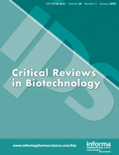
CRITICAL REVIEWS IN BIOTECHNOLOGY
Scope & Guideline
Advancing the Frontiers of Biotechnology Knowledge
Introduction
Aims and Scopes
- Biotechnological Innovations:
The journal focuses on novel biotechnological approaches across various sectors, including agriculture, healthcare, and environmental biotechnology, showcasing recent advancements and their implications. - Metabolic Engineering:
A significant emphasis is placed on metabolic engineering techniques to enhance microbial production systems, including the development of microbial cell factories for the synthesis of valuable compounds. - Synthetic Biology:
The scope includes the application of synthetic biology principles to engineer organisms for specific functions, with a focus on genome editing technologies like CRISPR/Cas. - Sustainability and Environmental Biotechnology:
The journal addresses sustainable practices in biotechnology, including waste valorization, bioremediation of pollutants, and the development of biodegradable materials. - Health and Nutraceuticals:
Research related to the production of bioactive compounds, probiotics, and nutraceuticals is highlighted, emphasizing their therapeutic potential and applications in human health. - Microbial Applications:
A core area of focus is on microbial applications in various industries, including food, pharmaceuticals, and biofuels, detailing methods for enhancing microbial processes and product yields.
Trending and Emerging
- Microalgal Biotechnology:
Recent publications highlight the potential of microalgae for sustainable biofuel production, nutraceuticals, and bioremediation, indicating an increasing interest in their versatile applications. - CRISPR and Gene Editing Technologies:
The rise of CRISPR technology as a tool for precise genome editing is a trending topic, with numerous articles discussing its applications in agriculture, medicine, and synthetic biology. - Bioprocess Optimization and Scale-Up:
There is a growing emphasis on optimizing bioprocesses for industrial applications, including scale-up strategies and bioreactor design, to enhance production efficiency. - Microbial Consortia and Synergies:
The exploration of microbial consortia for enhanced bioprocessing and bioremediation is gaining traction, reflecting a shift towards understanding interactions in microbial communities. - Sustainable Bioproduction:
Research focused on sustainable production methods, including the use of waste materials and renewable resources, is increasingly prominent, highlighting a commitment to environmentally friendly biotechnological practices.
Declining or Waning
- Traditional Genetic Engineering Techniques:
There is a noticeable decrease in articles focused solely on traditional genetic engineering methods, as newer, more precise techniques such as CRISPR/Cas9 gain prominence. - Conventional Agricultural Biotechnology:
Research centered on conventional agricultural biotechnology, such as transgenic crops, seems to be waning, possibly due to increased interest in sustainable and organic farming practices. - Basic Microbiology:
While foundational microbiology remains important, the journal has shifted away from purely basic microbiological studies, favoring applications that demonstrate biotechnological relevance. - Single-Organism Studies:
There is a decline in studies focusing on single microbial strains without broader applications or comparative analyses, as the field moves towards a systems biology approach. - Non-Environmental Applications of Biotechnology:
Research that does not address environmental impacts or sustainability concerns is less frequently published, indicating a trend towards integrating ecological considerations into biotechnological research.
Similar Journals

Applied Food Biotechnology
Transforming food safety with groundbreaking research.Applied Food Biotechnology is a dynamic and engaging open-access journal dedicated to the interdisciplinary field of food biotechnology, published by Shahid Beheshti University of Medical Sciences, Faculty of Medicine. Since its inception in 2014, this journal has provided a platform for the dissemination of cutting-edge research that combines aspects of applied microbiology, biotechnology, and food science, significantly contributing to advancements in food safety, processing, and nutritional enhancement. With an impressive impact factor, the journal ranks Q3 in multiple relevant categories, including Applied Microbiology and Biotechnology, Biotechnology, and Food Science in 2023, highlighting its influence within these fields. The journal's scope encourages innovative studies that investigate the utilization of biological processes in food technology, aiming to foster both scientific inquiry and practical applications across diverse demographics. With its commitment to open access, Applied Food Biotechnology ensures that all research findings are readily available to researchers, professionals, and students globally, enhancing collaboration and knowledge sharing. Located in Tehran, Iran, this journal serves as a vital resource for anyone invested in the future of food biotechnology.

AMB Express
Connecting Researchers to Transformative Microbial DiscoveriesAMB Express is an esteemed open-access journal published by Springer, dedicated to the fields of Applied Microbiology and Biotechnology as well as Biophysics. Since its inception in 2011, the journal has played a pivotal role in disseminating cutting-edge research and advancements, particularly for the scientific community in Germany and beyond. With a notable impact factor and ranking in the top quartile of its categories, AMB Express is recognized for its contributions to the disciplines, ranking 29th in Biochemistry, Genetics and Molecular Biology and 37th in Applied Microbiology and Biotechnology, reflecting its commitment to high-quality scientific inquiry. Researchers, professionals, and students will find a wealth of knowledge within its pages, benefiting from a diverse array of articles that stimulate innovation and collaboration. As the journal continues its convergence from 2011 to 2024, it remains a vital source for anybody looking to stay at the forefront of microbiological and biotechnological studies.
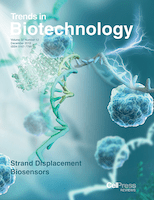
TRENDS IN BIOTECHNOLOGY
Pioneering Research for a Biotechnological FutureTRENDS IN BIOTECHNOLOGY, published by CELL PRESS, stands as a premier journal since its inception in 1983, focusing on the dynamic and ever-evolving fields of bioengineering and biotechnology. With a notable impact factor and ranking in the top quartile (Q1) of its categories for 2023, this journal is recognized for its contribution to advancing scientific knowledge, boasting a Scopus rank of #5/311 in Biotechnology and #5/162 in Bioengineering, placing it in the 98th and 97th percentiles, respectively. Although it does not operate under an open access model, TRENDS IN BIOTECHNOLOGY ensures a rigorous peer-review process that provides a platform for high-quality research that influences both academic and industrial advancements. The journal's objectives encompass the dissemination of cutting-edge research findings, reviews, and insights that foster innovation in biotechnological applications, making it an invaluable resource for researchers, professionals, and students alike. With its broad scope across the intersection of biosciences and technology, TRENDS IN BIOTECHNOLOGY continues to lead discussions and developments that shape the future of the biotechnology landscape.

APPLIED BIOCHEMISTRY AND BIOTECHNOLOGY
Driving Discoveries in Applied Microbiology and BeyondApplied Biochemistry and Biotechnology is a leading journal published by Springer, dedicated to advancing research in the interdisciplinary fields of biochemistry, biotechnology, and applied microbiology. Established in 1981, this peer-reviewed journal covers a wide range of topics that encompass innovative techniques, methodologies, and applications of biochemistry and biotechnology in medicine, environmental engineering, and molecular biology. With a Q2 ranking in several categories and an increasing impact factor, the journal demonstrates significant influence and credibility within the scientific community. While traditionally subscription-based, the journal offers avenues for open access through selective agreements, making high-quality research accessible to a broader audience. Researchers, professionals, and students alike will find Applied Biochemistry and Biotechnology to be an invaluable resource for the latest developments and applications in biochemistry and its related fields, aiding in the quest for sustainable solutions and novel biotechnological advancements.

Microbial Cell Factories
Innovating Tomorrow's Biotechnology with Microbial Cell FactoriesMicrobial Cell Factories is a premier peer-reviewed journal dedicated to the field of applied microbiology and biotechnology, published by BMC in the United Kingdom since 2002. With an impressive impact factor, this journal has consistently ranked within the Q1 category across multiple disciplines, including Applied Microbiology, Bioengineering, and Biotechnology, showcasing its significance in the scientific community. The journal’s commitment to open access ensures that innovative research is freely available to researchers, professionals, and students worldwide, fostering collaboration and knowledge dissemination. With a strong presence in Scopus rankings, Microbial Cell Factories is recognized for its contributions to advancing the understanding and application of microbial processes in production systems, making it an essential resource for those involved in the microbiological and biotechnological fields.
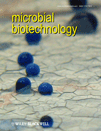
Microbial Biotechnology
Driving excellence in microbial research and technology.Microbial Biotechnology, published by WILEY, stands at the forefront of innovation in the field of applied microbiology and biotechnology, showcasing cutting-edge research and advancements within both academic and industrial contexts. As an Open Access journal since 2012, it ensures that high-quality research is easily accessible to researchers, professionals, and students globally, promoting knowledge sharing and collaboration. With an impressive impact, the journal holds a Q1 ranking in its categories—Applied Microbiology and Biotechnology, Biochemistry, Bioengineering, and Biotechnology—demonstrating its significance in the scientific community. The journal currently boasts a strong Scopus ranking in several relevant disciplines, including a top 10% position in Applied Microbiology and Biotechnology, highlighting its critical role in disseminating influential findings. Designed to foster dialogue and advance technology within the microbial sciences, Microbial Biotechnology is an essential resource for anyone committed to leveraging microbial processes for sustainable and innovative solutions.

Research Journal of Biotechnology
Exploring the frontiers of biotechnology research.Research Journal of Biotechnology is a premier publication dedicated to advancing the field of biotechnology through the dissemination of impactful research articles. Published by Research Journal Biotechnology in India, this journal operates under an Open Access model, facilitating unrestricted access to high-quality research for researchers, professionals, and students worldwide. With an ISSN of 2278-4535 and an E-ISSN of 2278-4535, the journal aims to serve as a comprehensive platform for innovative studies in Applied Microbiology and Biotechnology, Bioengineering, and Biotechnology. Despite its current Q4 quartile ranking in these categories, the journal aspires to extend its influence and visibility in the academic community, aiming for greater impact in the future. The journal features research articles that span a wide array of topics in biotechnology, fostering a collaborative and knowledge-rich environment for national and international scholars. We invite you to explore, contribute to, and engage with the expanding landscape of biotechnological research through the Research Journal of Biotechnology.
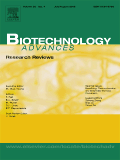
BIOTECHNOLOGY ADVANCES
Exploring Tomorrow's Biotechnological BreakthroughsBIOTECHNOLOGY ADVANCES is a premier, peer-reviewed journal published by PERGAMON-ELSEVIER SCIENCE LTD, dedicated to advancing knowledge in the rapidly evolving fields of biotechnology and bioengineering. With an ISSN of 0734-9750 and an E-ISSN of 1873-1899, this esteemed journal covers a wide spectrum of topics relevant to applied microbiology, molecular biology, and biochemical innovation. Recognized for its academic rigor, it holds a distinguished position in the top quartile (Q1) in multiple categories, including Applied Microbiology and Biotechnology, Bioengineering, and Biotechnology, further evidenced by its high rankings in Scopus, where it ranks #3/127 in Applied Microbiology and Biotechnology and #7/311 in Biotechnology. Researchers and professionals in the field value the journal not only for its comprehensive coverage of cutting-edge research but also for its commitment to disseminating critical findings and fostering collaboration. While BIOTECHNOLOGY ADVANCES currently operates under a subscription model, its potential impact on future innovations in biotechnology cannot be overstated, making it an essential resource for anyone interested in the forefront of biotechnological advancements.
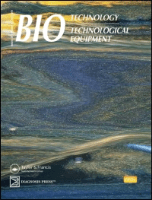
BIOTECHNOLOGY & BIOTECHNOLOGICAL EQUIPMENT
Transforming Laboratory Discoveries into Practical SolutionsBIOTECHNOLOGY & BIOTECHNOLOGICAL EQUIPMENT is a leading open access journal published by TAYLOR & FRANCIS LTD from the United Kingdom, dedicated to advancing the field of biotechnology since its inception in 1990. Committed to disseminating high-quality research, the journal has transitioned to open access since 2014, enhancing its accessibility for researchers, professionals, and students alike. With a notable impact in the field, it is categorized in the Q3 quartile for Biotechnology as of 2023 and ranks #193 out of 311 in the Scopus categories for Biochemistry, Genetics, and Molecular Biology. The journal aims to cover a diverse range of topics related to both biotechnological advancements and the equipment that supports them, thus fostering innovative research and practical applications in the biotechnology sector. With an evolving scope that reflects the dynamic nature of biological research, BIOTECHNOLOGY & BIOTECHNOLOGICAL EQUIPMENT plays a crucial role in bridging the gap between laboratory studies and real-world applications, making it an essential resource for anyone involved in biotechnology research.

JOURNAL OF MICROBIOLOGY
Leading the charge in microbiological research and innovation.JOURNAL OF MICROBIOLOGY, published by the Microbiological Society Korea, is a prestigious peer-reviewed journal dedicated to the advancement of knowledge in the fields of microbiology, applied microbiology, and biotechnology. Established in 1996, this journal serves as a vital platform for researchers and professionals from around the globe to disseminate their findings and engage in multidisciplinary discussions pertaining to microbial sciences. With an H-index that reflects its impact, the journal holds a commendable Q2 ranking in key categories including Applied Microbiology and Biotechnology, as well as Medicine (Miscellaneous), which underscores its significance in the academic community. Despite being a subscription-based journal, the JOURNAL OF MICROBIOLOGY aims to contribute to the understanding of microbial processes and their applications, facilitating advancements that are essential in health, industry, and environmental sciences. Researchers, students, and practitioners are encouraged to explore this rich resource for the latest research and trends in microbiology.